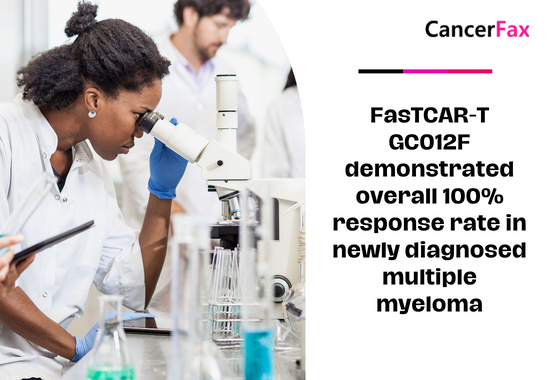Introduction
Even in transplant-eligible (TE) patients, typical first-line treatments for high-risk (HR) newly-diagnosed multiple myeloma (NDMM) have dismal outcomes. A high-efficacy, safe CAR-T treatment could address this large unmet need. Autologous B cell maturation antigen (BCMA) and CD19 dual-targeting CAR-T cell therapy GC012F is created using the innovative FasTCAR-T next-day manufacturing platform [J Clin Oncol 41, 2023 (suppl; abstr 8005)]. The phase I single-arm study was undertaken in frontline TE high-risk NDMM patients to assess the safety and feasibility of GC012F CAR-T cell therapy (NCT04935580). The first 13 points were given at ASH 2022 (Blood (2022) 140 (Supplement 1): 889-890). We offer revised data with longer follow-up and 9 additional patients treated (N=22).
Following a phase 1 trial, GC012F, an autologous dual-targeted CD19 and B-cell maturation (BCMA) chimeric antigen receptor (CAR) T-cell therapy, was found to be a promising frontline treatment for transplant-eligible, high-risk, newly diagnosed multiple myeloma patients.1
Gracell Biotechnologies’ GC012F had 100% ORR and 100% MRD-sCR. Athens hosted the 20th International Myeloma Society (IMS) Annual Meeting, where the business presented its abstract.
Method
This clinical trial is a phase I investigator-initiated trial with an open-label design and a single arm. The trial identifier is NCT04935580. Participants aged 18-70 with one or more of the above characteristics were deemed eligible for the study. R-ISS-II or R-ISS-III; deletion of chromosome 17p, translocation between chromosomes 4 and 14, translocation between chromosomes 14 and 16, or amplification of chromosome 1q21 with at least 4 copies; presence of extramedullary disease (EM); IgD or IgE subtype; lactate dehydrogenase (LDH) levels higher than the upper limit of normal; or meeting any of the high-risk criteria defined by mSMART3.0.
Here, we report a total of 22 evaluable patients with a median age of 59 years (ranging from 43 to 69 years) as of the data cutoff date. The time interval from diagnosis to infusion had a median of 100 days, with a range of 63 to 152 days. All patients had one or more high-risk characteristics, such as 91% having R-ISS stage II or III, 55% with extramedullary involvement (EM), 32% having 1q21≥4 copies, and 9% having IgD type.
Out of the 22 patients, 21 underwent two cycles of induction therapy with bortezomib, lenalidomide, and dexamethasone (VRd), whereas one patient received one cycle of bortezomib, epirubicin, and dexamethasone (PAD) followed by one cycle of VRd before the infusion. GC012F was given as a single infusion at three different dose levels: 1×10 5/kg (n=1), 2×10 5/kg (n=4), or 3×10 5/kg (n=17), following a normal three-day lymphodepletion regimen involving cyclophosphamide and fludarabine.
Results
Preliminary findings from a cohort of 16 participants in the research were showcased at the 2022 American Society for Hematology (ASH) Annual Meeting. Three additional patients underwent evaluation, and a longer-term follow-up was conducted for the first group of 16 patients. The experiment was an open-label, single-arm, phase 1 investigator-initiated trial (IIT) that administered GC012F to participants at 3 specific dose levels. Out of all the patients, 89% were categorized as either stage II or stage III, and 63% had extramedullary plasmacytoma.
The achievement of 100% overall response rate (ORR) and minimal residual disease (MRD) single-cell resolution (scR) occurred within a median follow-up period of 15.3 months (ranging from 3.1 months to 24.5 months).
“Patients diagnosed with high-risk newly diagnosed multiple myeloma (NDMM), including those who are eligible for a transplant, generally experience unsatisfactory results with the current conventional treatment,” stated Dr. Li.1 Frailty, a high-risk trait, is associated with a considerably lower overall survival rate of 57% at 3 years, compared to fit patients (with an overall survival rate of 84% at 3 years) or unfit patients (with an overall survival rate of 76% at 3 years).
The data indicated that patients had a high level of tolerance towards GC012F, and no novel safety indicators were detected. Six patients experienced mild cytokine release syndrome (CRS). Out of these cases, 5 cases (26%) were classified as grade 1, while only 1 case (5%) was classified as grade 2. No instances of immune effector cell-associated toxicity (ICANS) of any severity were detected.
Both of the two FDA-approved CAR T-cell treatments for refractory or relapsed multiple myeloma cancer have a greater incidence of cytokine release syndrome (CRS). The drug Ciltacabtagene autoleucel, also known as Carvykti, observed that Cytokine Release Syndrome (CRS) was present in 95% (92 out of 97) of the patients.Abecma, also known as 3 Idecabtagene vicleucel, causes cytokine release syndrome (CRS) in 85% (108/127) of patients.4
GC012F is undergoing evaluation in patients with various hematological malignancies, including B-cell non-Hodgkin lymphoma, in addition to the phase 1 research conducted in patients with relapsed or refractory multiple myeloma.
About GC012F
GC012F is a FasTCAR-enabled BCMA/CD19 dual-targeting CAR-T product candidate that is currently being evaluated in IIT studies in China for the treatment of multiple myeloma and B-cell non-Hodgkin’s lymphoma. GC012F simultaneously targets CD19 and BCMA to drive fast, deep and durable responses, which can potentially improve efficacy and reduce relapse in multiple myeloma and B-NHL patients.
About FasTCAR
CAR-T cells manufactured on Gracell’s proprietary FasTCAR platform appear younger, less exhausted, and show enhanced proliferation, persistence, bone marrow migration, and tumor cell clearance activities, as demonstrated in preclinical studies. With next-day manufacturing, FasTCAR is able to significantly improve cell production efficiency, which may result in meaningful cost savings, and, together with its fast release time, enable enhanced accessibility of cell therapies for cancer patients.
About Gracell
Gracell Biotechnologies Inc. (“Gracell”) is a global clinical-stage biopharmaceutical company dedicated to discovering and developing breakthrough cell therapies. Leveraging its pioneering FasTCAR and TruUCAR technology platforms and SMART CARTTM technology module.
Gracell is developing a rich clinical-stage pipeline of multiple autologous and allogeneic product candidates with the potential to overcome major industry challenges that persist with conventional CAR-T therapies, including lengthy manufacturing times, suboptimal cell quality, high therapy costs, and a lack of effective CAR-T therapies for solid tumors. For more information on Gracell, please visit www.gracellbio.com. Follow @GracellBio on LinkedIn.


